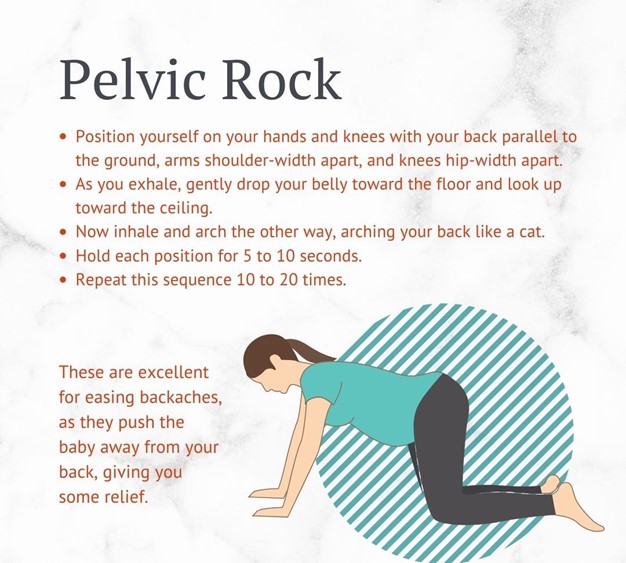A nurse is transcribing a client's prescription for erythromycin 500 mg four times per day. Which of the following information should the nurse clarify with the provider?
Time
Medication
Dosage
Route
The Correct Answer is D
A. The prescription specifies “four times per day,” which is clear.
B. The medication specified is erythromycin, which is clear.
C. The dosage of 500 mg is clearly specified..
D. The route of administration eg. oral, topical is not specified and needs to be clarified to ensure proper administration.
Nursing Test Bank
Naxlex Comprehensive Predictor Exams
Related Questions
Correct Answer is D
Explanation
Pelvic rocking exercises can help relieve lower back pain during pregnancy. The client can perform this exercise by getting on their hands and knees, keeping their back straight, and gently rocking their pelvis back and forth. This helps to stretch and strengthen the muscles in the lower back and pelvis.

A. Sit in a hot tub for 30 min every evening: Hot tubs and hot baths are not recommended during pregnancy as they can raise the body temperature too high, which can be harmful to the developing fetus.
B. Raise chairs to keep knees lower than hips: This recommendation is more appropriate for promoting good posture and reducing strain on the back, but it may not specifically address lower back pain.
C. Use the arms to pick up heavy items: It is important to avoid heavy lifting during pregnancy as it can strain the back and increase the risk of injury. It is recommended to use proper lifting techniques, such as bending the knees and using the leg muscles rather than the back muscles, to lift objects.
Correct Answer is ["B","D"]
Explanation
-
Assist the client with a bath: The client is independently transferring out of bed and ambulating in the hallway. Since they are managing personal mobility well, there is no immediate need for assistance with bathing, and this does not address the client’s most pressing issues.
-
Encourage oral fluid intake: The client is experiencing hard, painful bowel movements and abdominal cramping, which are signs of constipation. Increased oral fluid intake can help soften stool and promote more regular bowel movements, making this a supportive and appropriate intervention.
-
Irrigate indwelling catheter with 500 mL of fluid: The client is voiding 100 mL/hr of pink urine, which is a normal finding in the early postoperative period and does not suggest catheter obstruction. Therefore, irrigation is not indicated and could introduce infection unnecessarily.
-
Administer an enema: The client reports painful, incomplete bowel elimination and abdominal cramping, which may indicate constipation or fecal impaction. Administering an enema is an appropriate intervention to relieve discomfort and promote bowel evacuation.
-
Encourage prolonged dangling before ambulation: The client is already ambulating independently in the hallway, indicating they are tolerating activity well. There is no evidence of orthostatic intolerance, so prolonged dangling is not necessary.
Whether you are a student looking to ace your exams or a practicing nurse seeking to enhance your expertise , our nursing education contents will empower you with the confidence and competence to make a difference in the lives of patients and become a respected leader in the healthcare field.
Visit Naxlex, invest in your future and unlock endless possibilities with our unparalleled nursing education contents today
Report Wrong Answer on the Current Question
Do you disagree with the answer? If yes, what is your expected answer? Explain.
Kindly be descriptive with the issue you are facing.
